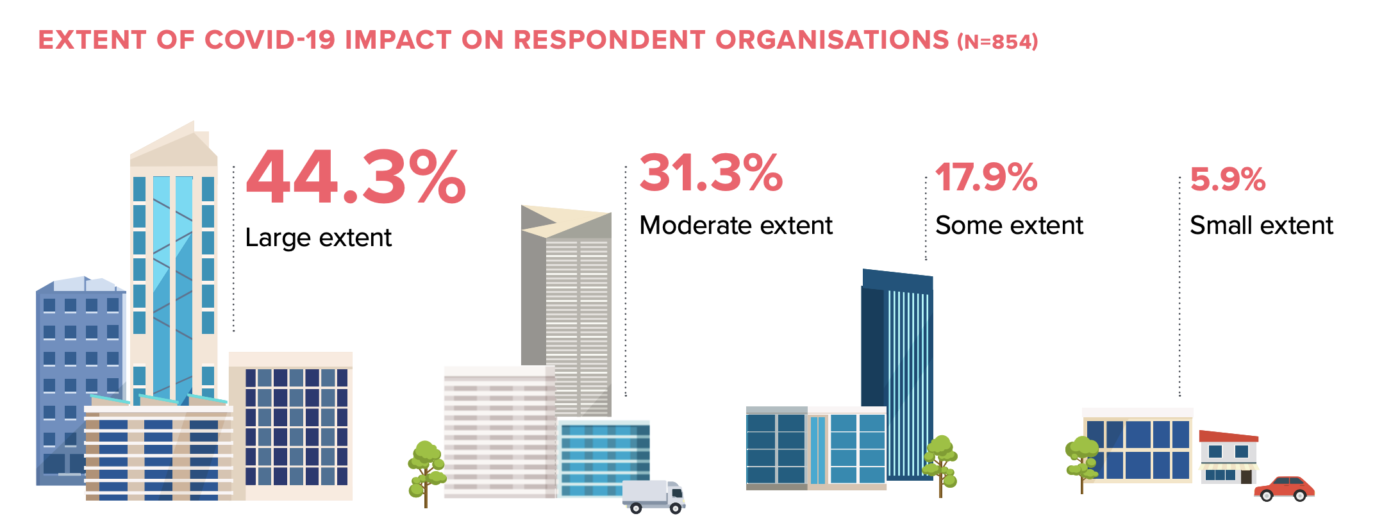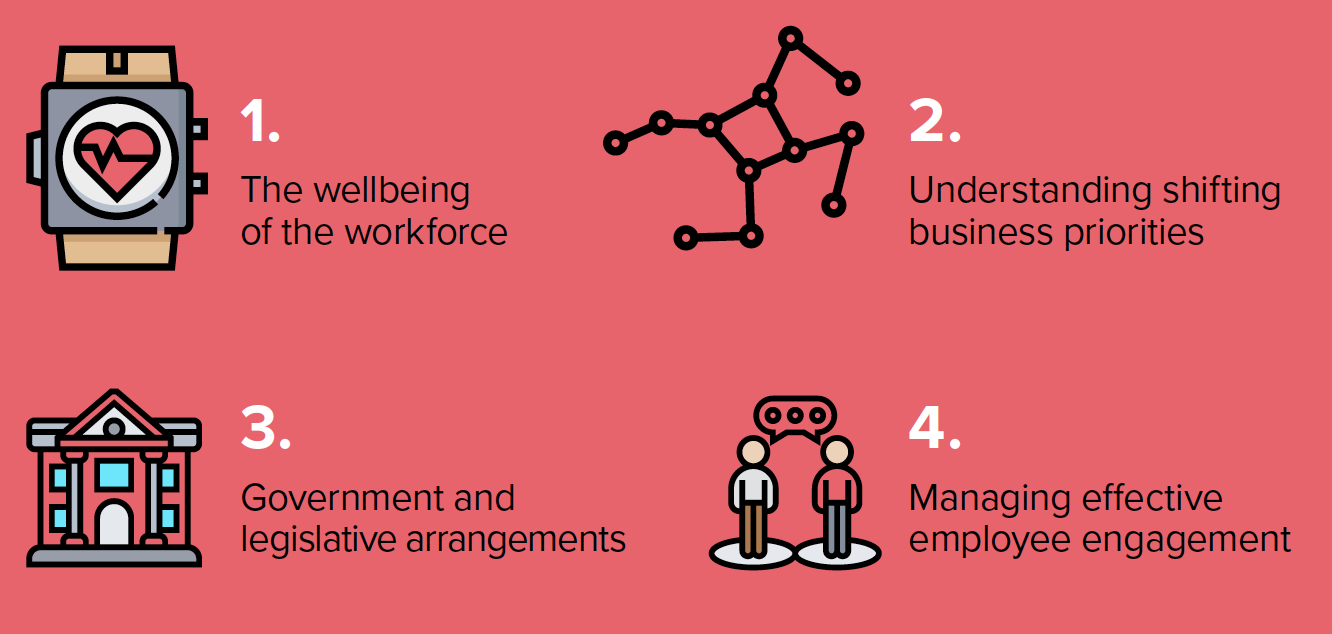New research from Australian HR Institute reveals HR professionals’ biggest stressors during the coronavirus pandemic.
Australia’s HR professionals are reporting stress, pressure and increased workloads. And, despite the imminent arrival of JobKeeper money, 42 per cent are worried about the possibility of forced redundancies.
COVID-19 has up-ended any plans we had for the year. And not only are we having to readjust our expectations for the next 12-18 months, there’s also a lot of stuff to deal with in the here and now. At the forefront of a lot of this is the HR department.
In the first week of April, the Australian HR Institute (AHRI) sent a survey out to HR professionals across the nation, from a variety of industries, and over 1,100 responded.
The research found 44 per cent of organisations have been impacted “to a large extent” by COVID-19 and less than one per cent say they haven’t been impacted at all.
The public sector has been hit the hardest, with 53 per cent of HR professionals in that sector saying the virus has impacted them to a large extent. Fifty-two per cent of not-for-profit respondents said the same, as did 35 per cent of those in the private sector.

Respondents said workloads had increased – with one person reporting they’re now working 70 hour weeks – and expressed concern around properly assessing employee wellbeing from afar. Pressure to understand and relay a lot of complicated legislation is keeping HR up at night, as are the parental challenges of balancing work with homeschooling obligations.
AHRI’s general manager of people and culture, Rosemary Guyatt, says it’s still a long road ahead for HR.
“While we’re hearing of a slight flattening [of the infection curve], COVID-19 hasn’t gone away and it won’t until we find a vaccine. Then you think about the economy. When the curve flattens to the extent to where the government says we can start meeting again, the economy isn’t going to pick up at the same time. Every business is readjusting and that will take quite a while.
“They’re saying, best case scenario, it’s 12 months until we have a vaccine. So we need to look that far ahead, and even longer than that, because national debt will be so significant and international travel will change. The repercussions from the economy are yet to be fully felt by many.”
The harsh realities
Almost a quarter of respondents felt their organisation was not prepared to respond to a global crisis and 55 per cent say their employers were only ‘somewhat’ prepared. Interestingly, 40 per cent say their business has been very effective in utilising their HR skills to manage this crisis. When you compare these two statistics it suggests that perhaps HR had been under-utilised prior to the pandemic.
“It’s good to hear that in a crisis employers are drawing on HR expertise and that they realise they need a people focused strategy to get through. The full suite of HR skills are being used intensely, all in one go. I think this crisis will really bring HR to the forefront.”
Around 80 per cent of respondents say their organisations have experienced a decrease in business activity of some kind, with this portion of respondents reporting this is either ‘somewhat’ (34 per cent), ‘moderately’ (29.5 per cent) or ‘very’ (16 per cent) challenging for them.
Though the government JobKeeper subsidy is designed to keep as much of Australia’s workforce employed as possible, the idea of forced redundancies has been either challenging or very challenging for nearly 23 per cent of respondents while a further 19 per cent say it’s ‘somewhat’ of a stressor. As we edge towards the end of the financial year, it’s highly likely we’ll see this percentage increase.
As for how workforces have already been shaped, almost a quarter of respondents’ organisations say they have retrained staff to work in different arms of the business. A larger 47 per cent have gone ahead and redeployed staff. And a sizeable 21 per cent have already had to make the tough choice to downsize.
“I would predict that percentage will increase,” says Guyatt. “However, by now a lot of Australian employers will know if they’re eligible for the JobKeeper payments, so that will impact their decisions. As businesses adjust, there’s going to be a need for new and different skills but others won’t be so relevant. HR professionals and business leaders will have to adjust their workforce to cater to that skills shift.
“Even when some businesses are re-opened again, they may need to rethink their products, services and delivery models.”
AHRI’s HR Pulse Report: Your voice during COVID-19 dives into more insights from the HR community about their biggest challenges and stressors during the global pandemic. AHRI members can download the full report here.
Many simultaneous challenges
Understanding a business’ shifting priorities has been challenging for 43 per cent of respondents and ‘very challenging’ for 22 per cent. Other challenges include navigating government legislation, such as JobKeeper.
Half of respondents are struggling to manage remote working (here’s HRM’s handy WFH tips for employers and individuals), and there’s also a large portion of respondents who are finding workplace social distancing rules to be difficult to manage.
The majority of people are also feeling a level of stress around ensuring their business leaders are communicating effectively with the workforce.
To overcome this, Guyatt suggests encouraging leaders to consistently share information about how the business is tracking – the good and the bad – in a way that’s “honest, authentic and caring”.
“Practically everyone will be concerned about their employment in some shape or form because we just don’t know what’s going to happen. Leaders need to understand that. It’s HR’s role to help their leaders to develop a new way of working.
“HR professionals provide an important voice in the quality and timeliness of leaders’ communications.”
She also encouraged HR professionals to stay abreast of award and legislative changes, so they can be the expert voice the executive leadership team can count on.
“You’ve got to do a lot in a much more time constrained manner than you’re used to. And you’ve only got one chance to get it right, so make sure the leader understands the need for care and attention to detail.
“Leaders are already being pulled from all angles, so they need to have the confidence that their HR partner brings that knowledge and skill and can quickly develop appropriate plans for the business.”
HR’s biggest stressor
We’re not just working from home at the moment. We’re working through a pandemic. And like HRM has said before, that often means shifting our expectations and taking more time to ensure everyone’s mental health is strong.
The latter was the most significant concern for respondents, with 93 per cent saying managing the wellbeing of staff was either somewhat, moderately or very challenging.

In comparison, only 45 per cent of HR professionals are worried about their own mental health. While this statistic certainly reflects a profession that’s passionate about caring for others, Guyatt strongly encourages HR professionals to turn their care inwards.
“You’re thinking of the wellbeing of the rest of the workforce while working extremely long days and often not taking a break until well into the afternoon. That’s not going to be sustainable. So remember to put yourself first and have your own wellbeing plan.”
She also suggests HR professionals share their wellbeing plans with the wider workforce.
“That might be having your lunch break or exercise time in your calendar. Because you are a role model for others’ mental and physical wellbeing. Note your influence in that space.”
Assessing mental health issues and being supportive through a screen is no easy task. Guyatt offers these tips for her fellow HR professionals.
- Implement a buddy system so it’s not all on the manager to check in and people know who else they can reach out to.
- Instead of getting straight down to business in a meeting, make more time for the personal stuff. You might even make this an agenda item to ensure it’s happening.
- Have a good eye on what employees’ work days look like, such as making sure people are having lunch breaks/not working over time.
- Have some levity in the week. Recognise that humour and fun are very important. This might have once been the domain of the social committee, she says, but now it should be on management’s agenda.
- Check in with your EAP provider to see how they’re gearing up to support a potentially larger client load.
“One of the positives of this is that we’re having conversations with different people than we normally would,” she says. “I’m heartened by the quality of a lot of the conversations that are being had. We’re a lot more conscious of people’s health and wellbeing.”
She’s calling on HR professionals to take care of each other too, and to create trusted support groups they can rely on.
“HR professionals should be sharing their learnings with each other. We’re all making ‘just in time’ decisions, and if we can improve that through coaching, support and advice in a timely manner, that will be a big help. We’ve all got our own area of expertise and it’s easy to narrow down into your own bunker, but we need to look up.
“We don’t have time to do the same networking we did in the past, but establish your key networks and have a small support team of experts around you. Hopefully AHRI is part of that.”
If you’d like to include AHRI in your support team, join our members only AHRI Lounge on LinkedIn to discuss what matters to you most.


Great research and supporting comments, really informative, thank you for giving us these insights.
Very interesting & timely article. The communication cannot be underestimated. Keeping everyone in the loop with business updates creates a buy in attitude from staff.